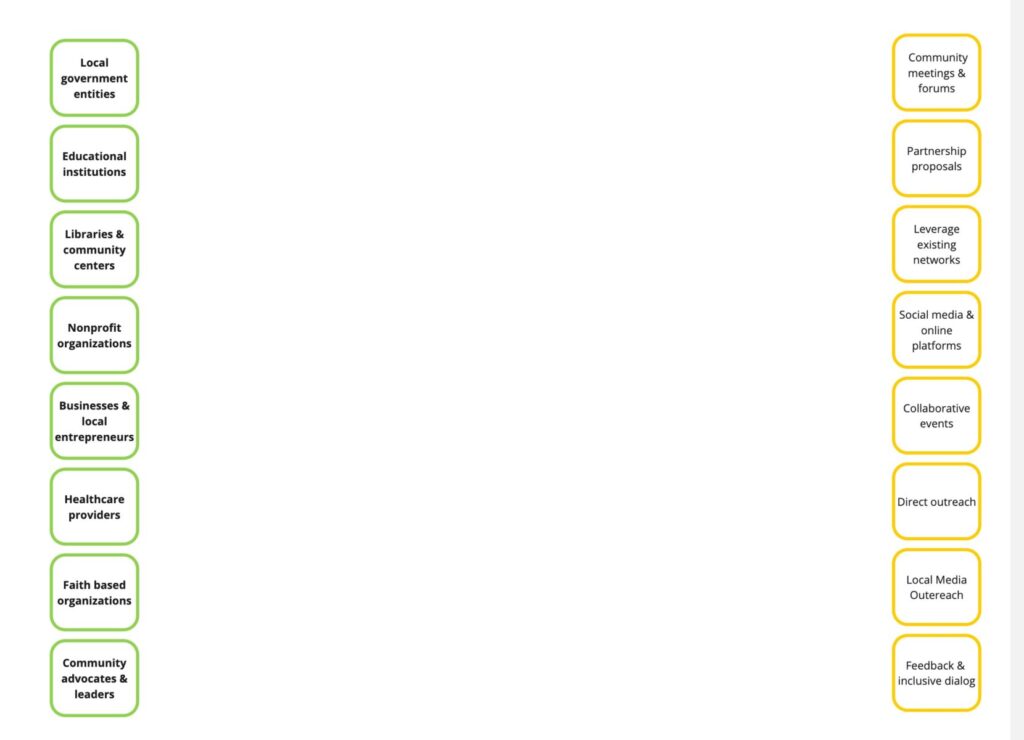Are you a human interested in Digital Equity?
Help plan our roadmap.

The following written for Michigan, is applicable for any community
See our “Community Actors & Actions Map” – template in the Miroverse (virtual whiteboard tools).

Promoting digital equity in Michigan requires collaboration with a diverse range of community stakeholders. These stakeholders play critical roles in understanding the unique needs of different communities and in implementing effective solutions. Here’s a breakdown of the key types of stakeholders and strategies for engaging them effectively:
- Local Government Entities: City councils, county officials, and regional planning bodies are pivotal. They have insights into local infrastructure needs and can assist in policy-making and funding allocation.
- Educational Institutions: Schools, colleges, and universities are crucial, particularly in underscoring the importance of digital equity for educational access. They can also provide training and resources.
- Libraries and Community Centers: These institutions often serve as access points for community members lacking home internet. They are trusted local resources for education and technology access.
- Non-Profit Organizations: Non-profits that focus on community development, education, and technology can be instrumental in reaching underserved populations.
- Businesses and Local Entrepreneurs: Particularly those in the tech sector, can offer resources, expertise, and potential funding.
- Healthcare Providers: Telehealth has become increasingly important, and healthcare providers can highlight the necessity of digital equity for health access.
- Faith-Based Organizations: Often at the heart of communities, they can reach a wide demographic and provide venues for training and access.
- Community Advocates and Leaders: Individuals who are actively engaged in community development and have a deep understanding of local needs.
Best Methods to Find and Approach Them
- Community Meetings and Forums: Attend or organize meetings where these stakeholders are likely to be present. This provides an opportunity to network and discuss digital equity initiatives.
- Partnership Proposals: Create detailed proposals outlining potential partnerships, benefits, and roles each stakeholder can play. Tailor these proposals to each type of stakeholder.
- Leverage Existing Networks: Utilize existing networks and relationships to reach out to these stakeholders. Personal introductions or referrals can be more effective than cold outreach.
- Social Media and Online Platforms: Use these platforms to identify and engage with community leaders and organizations actively discussing local issues, including digital equity.
- Collaborative Events: Host workshops, seminars, or webinars that address digital equity, inviting stakeholders to participate or speak.
- Direct Outreach: Contact organizations and individuals directly through emails or phone calls, briefly explaining the purpose and seeking a meeting or discussion.
- Local Media Outreach: Use local media channels to publicize the need for digital equity and invite stakeholders to join the cause.
- Feedback and Inclusive Dialogue: When approaching stakeholders, emphasize the importance of their feedback and input, ensuring them that their contributions will shape the initiative.
By using these methods, you can effectively engage with key community stakeholders in Michigan and foster collaborative efforts towards enhancing digital equity. Tailoring your approach to each stakeholder’s interests and demonstrating the mutual benefits of participation can lead to positive responses and lasting partnerships.
Your “Collaboration” Homework
This content is the basis for course assignments in progress.
The course exercise includes:
- In the left column indicate whether you are a member of that group or have a contact.
- Name the top 5 things you could do and draw a line from the role on the left to actions on the right.
- Put a few keywords on the connection lines that will be tags for your interactions.
- We will schedule a time for potential collaborators to meet in a Zoom call.


